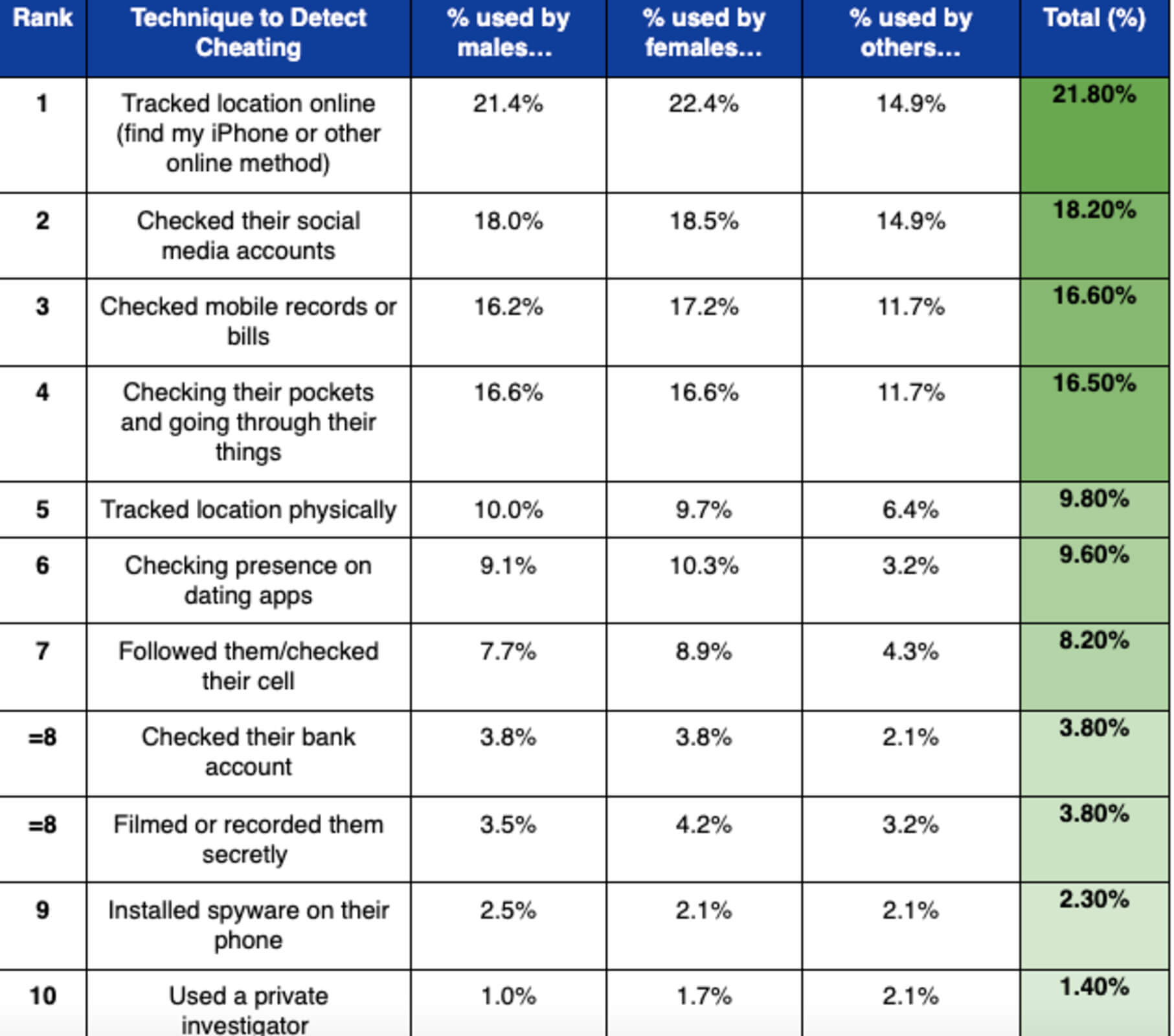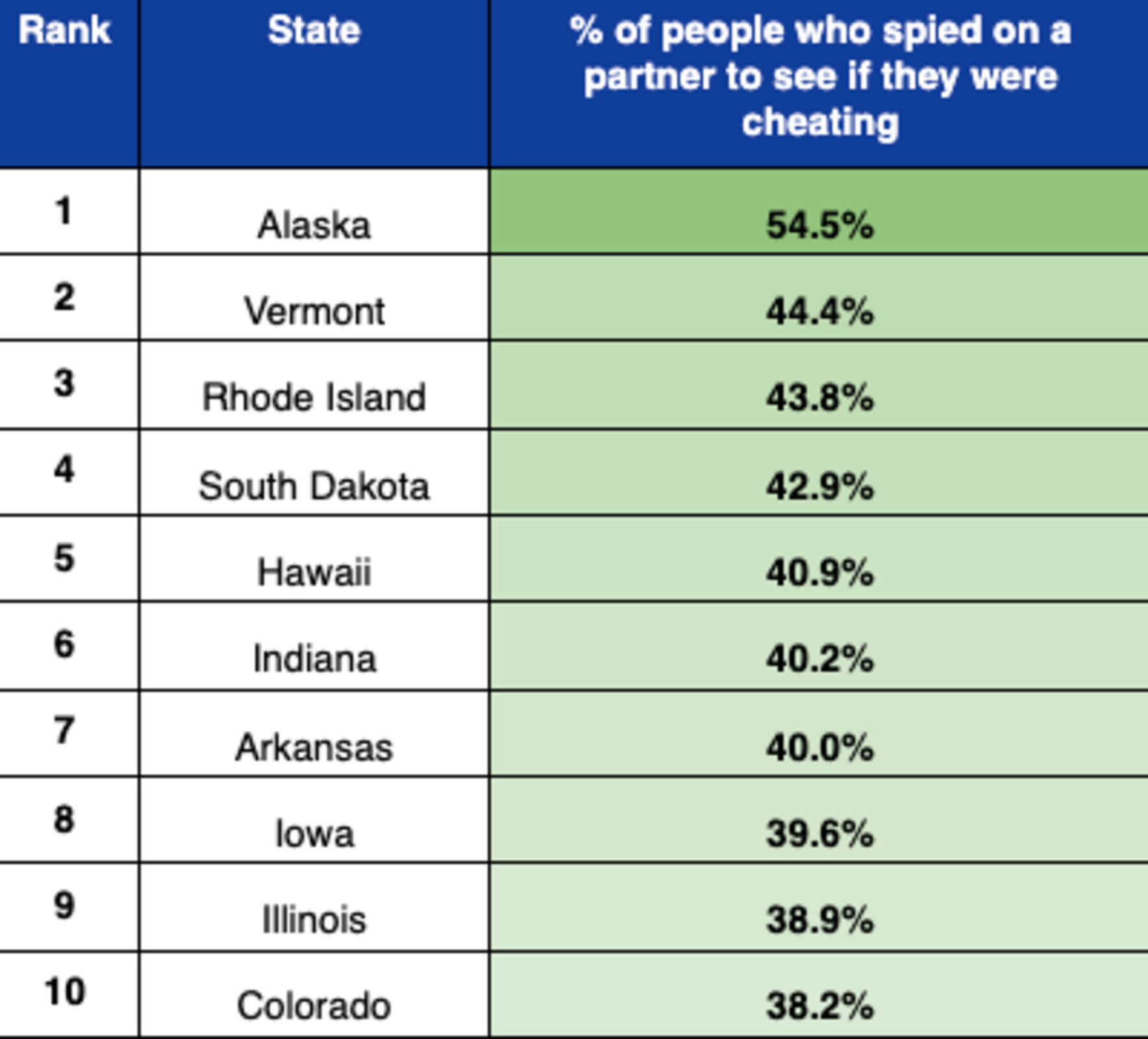NEW YORK — Love is definitely not in the air. A recent survey has uncovered some eye-opening statistics about infidelity and relationship snooping in the United States. Researchers spoke to 5,000 participants and found nearly half say they have had a partner who was unfaithful.
So, how exactly did they find out their lover was cheated on them? By spying on their partner, of course.
The BonusFinder.com survey found:
- More than 40 percent of American respondents revealed that they have been cheated on by their partners.
- 12.8 percent of participants discovered their partner was cheating after engaging in some form of spying.
- Surprisingly, over a quarter (27.7%) chose to stay in the relationship even after they were cheated on.
- One in 10 males admitted to stalking their partner to confirm suspicions of cheating.
Most Popular Spying Methods

One method that emerged from the survey as a potential legal minefield is installing spyware on a partner’s phone. It turns out that 2.3 percent of respondents admitted to resorting to this invasive tactic. Installing spyware on someone’s phone can lead to serious legal consequences, including potential imprisonment and hefty fines. This is because such actions often violate privacy and cybercrime laws.
States Most Likely to Spy on Partner

The survey also pinpointed states where relationship snooping, and the use of spyware are more prevalent:
- Vermont ranked as the state with the highest percentage of respondents (22.2%) who admitted to using extreme measures like spyware when they suspected their partner of cheating.
- Louisiana came in second place, with just over five percent of respondents acknowledging the use of spyware to uncover infidelity.
- Alaskans topped the list for relationship snooping, with a staggering 54.5 percent of respondents admitting to spying on their partners. Additionally, 45.5 percent of Alaskans said they track their partner’s location online, making it the most common method of investigating suspected infidelity in the state.
- Vermont followed closely behind with 44.4 percent of respondents engaging in relationship snooping. Similar to Alaska, online snooping was the most prevalent method, with 33.3 percent tracking their partner’s location online.
- Rhode Island secured the third spot, with 43.8 percent of respondents admitting to spying on their partners. Interestingly, 37.5 percent of Rhode Island respondents chose to stay in the relationship despite their partner’s infidelity.
On the flip side, some states showed a more ethical approach:
- North Dakota respondents proudly claimed a clean record, with none admitting to spying on a suspected cheating partner.
- Utah had only 20.4 percent of respondents admitting to spying on their partners.
- West Virginia had 25.9 percent of respondents confessing to snooping on a suspected cheating partner.
Suspecting that your partner is cheating can be a devastating and confusing experience. It’s important to remember that you’re not alone, and there are things you can do to cope with this difficult situation.
Here are some steps you can take if you suspect your partner is cheating on you:
-
Gather evidence: Before confronting your partner, it’s important to gather some evidence to support your suspicions. This could include things like screenshots of text messages or phone records, or observations of your partner’s behavior.
-
Talk to someone you trust: Talking to a friend, family member, or therapist can help you process your emotions and get support. They may also be able to offer helpful advice.
-
Consider seeking professional help: If you’re struggling to cope with the situation on your own, consider seeking professional help from a therapist. A therapist can help you understand your emotions, develop coping mechanisms, and make healthy decisions about your relationship.
-
Confront your partner: Once you’ve gathered some evidence and have had time to process your emotions, you can confront your partner about your suspicions. Be calm and direct, and let them know what you’ve observed.
-
Listen to their explanation: Give your partner a chance to explain their behavior. They may have a legitimate reason for what you’ve observed.
-
Decide what you want to do: Once you’ve heard your partner’s explanation, you need to decide what you want to do next. This could involve trying to repair the relationship, taking a break, or ending the relationship.
-
Take care of yourself: This is a difficult time, so it’s important to take care of yourself. Make sure you’re eating healthy, getting enough sleep, and exercising. And don’t be afraid to reach out for help from friends, family, or a therapist.
Remember, you deserve to be in a relationship that is based on trust and honesty. If you’re not getting that from your partner, it may be time to move on.
You might also be interested in:
- Why People Cheat: Ashley Madison Study Challenges Long-Held Beliefs About Infidelity
- Men and women view physical, emotional infidelity differently
- Best relationship advice: Saying ‘thank you’ more often vital for healthy, thriving romance
Survey methodology:
BonusFinder.com conducted a uStats.org survey which analyzed responses from 5,000 Americans. Survey results were recorded on Sept. 12 and are subjected to change.

